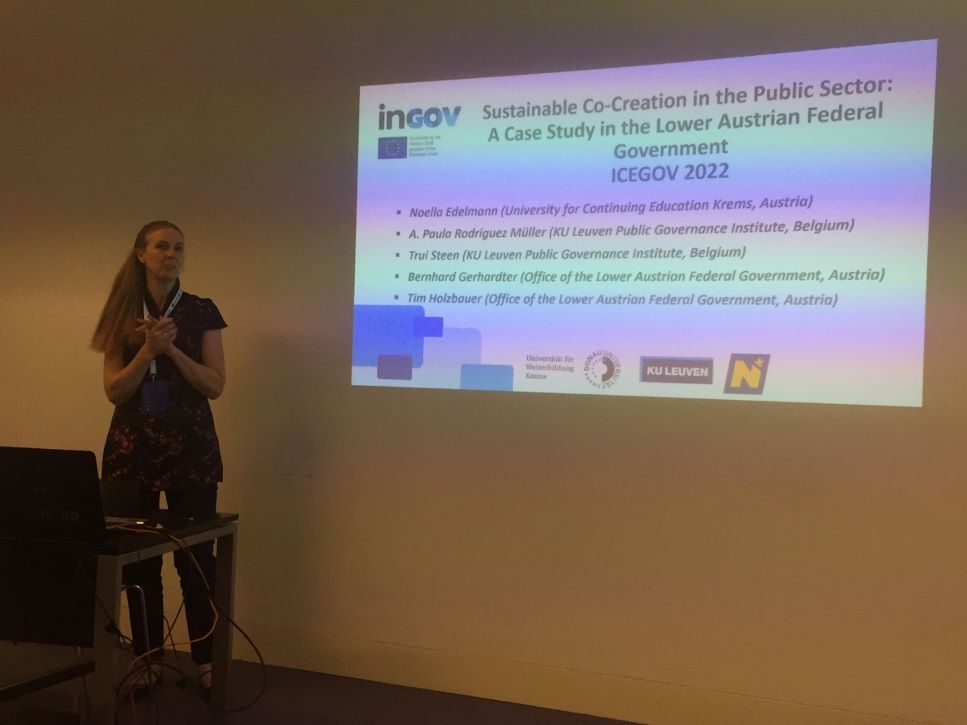inGov at ICEGOV 2022
The 15th edition of ICEGOV was held 4-7 October 2022 in Guimarães, Portugal. The theme was Digital Governance for Social, Economic, and Environmental Prosperity, and the conference aimed to contribute to the debate on how digital technologies can be effectively harnessed to foster prosperity and development as well as provide contributions on achieving a more inclusive, just, resilient and trustworthy world.
The 15th edition of ICEGOV was held 4-7 October 2022 in Guimarães, Portugal.
The theme was Digital Governance for Social, Economic, and Environmental Prosperity, and the conference aimed to contribute to the debate on how digital technologies can be effectively harnessed to foster prosperity and development as well as provide contributions on achieving a more inclusive, just, resilient and trustworthy world. Partners from the inGOV consortium, Alexandros Gerontas (University of Macedonia, Greece) and Noella Edelmann (University of Continuing Education Krems, Austria) presented results gained from the project and the pilots so far.
In the track “Digital transformation and innovation of public services and governments“, Noella presented the results from the co-creation process conducted in the Austrian pilot, the Federal Government of Lower Austria. The presentation focused on the results gained from the needs analysis, but also addressed the need to consider external stakeholders (such as citizens and businesses) as well as the different internal stakeholders within public administrations. The careful selection of stakeholders as well as a consideration of their different needs are important as they have an impact the development of sustainable, digital public services. The paper “Sustainable Co-Creation in the Public Sector: A Case Study in the Lower Austrian Federal Government”, was written by Noella together with Ana Paula Rodriguez and Trui Steen (KU Leuven) as well as the case owners Bernhard Gerhardter and Tim Holzbauer. The paper is available Open Access from ACM (DOI: 10.1145/3560107.3560126).

Additionally, Alexandros, on behalf of the University of Macedonia and CERTH team, presented two papers. In the same track, he presented a paper titled: “Integrating BPMN with DMN to model complex public services: the case of getting a transportation card for disabled citizens in Greece”. Aim of this paper is to investigate the benefits and challenges of modelling complex public services (PSs) using BPMN and DMN. For this purpose, the Greek PS “Getting a Transportation Card for Disabled Citizen”, inGOV’s Greek pilot, is analyzed and BPMN is used to model this PS in two different ways, with and without the use of DMN. The results suggest that DMN models provide useful insights into the different PS versions while BPMN diagrams become simpler and more understandable. Authors of this paper are: Efthimios Tambouris, Theocharis Tavantzis, Konstantinos Vergidis, Alexandros Gerontas and Konstantinos Tarabanis. The paper will be available at: https://doi.org/10.1145/3560107.3560129.
Also, in the track “Industry and Public Sector” Alexandros presented a paper titled: “Towards an Evaluation Plan for Integrated Public Service (IPS) Provision”. Aim of this paper is to present the evaluation strategy and methods to be used for evaluating the results of inGov project. More specifically, three iterations of pilot implementations are planned with each one following a cycle of Plan – Implement – Analyse actions. Overall, three types of evaluators are involved in inGov evaluations: pilot partners, pilot stakeholders (public employees, citizens, businesses, NGOs) and domain experts. Six evaluation dimensions are pursued to cover all project results, which are technical, organizational and policy-related. Authors of this paper are: Eleni Panopoulou.
Efthimios Tambouris, Alexandros Gerontas and Konstantinos Tarabanis. The paper will be available at: https://doi.org/10.1145/3560107.3560197.

Contact for details:
Noella Edelmann [email protected]
Efthimios Tambouris [email protected]


